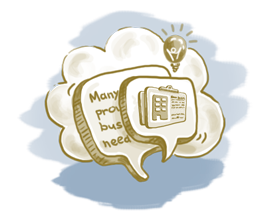In recent articles we have been discussing the depth to which the ROI of any potential CRM solution purchase must be explored.
We have emphasized the importance of surveying everyone in the company who will be interacting with it, with special attention being given to measuring the impact on and empowerment of your sales force. It must be checked for its learning and implementation curve, and numerous other factors.
Another additional crucial factor for evaluating CRM solution ROI is determining its compatibility with existing hardware, software, and mobile platforms within your company. The more work required of your IT department in making that CRM application compatible, the longer it will take for your CRM purchase to give you the return on that rather substantial investment.
Hence, any company evaluating a CRM solution should take the time to fully explore any possible compatibility problems as part of an ROI evaluation.
 Requirements for Hardware
Requirements for Hardware
While it might seem like a “no brainer” the last thing you want is to find out after your company has purchased a CRM application that the required hardware isn’t available, or isn’t available in all sectors of the company where CRM will be used. Hardware requirements should always be checked prior to a software purchase, and company computers should be checked over to ensure that the CRM solution will function where it should.
Operating Systems
It’s quite likely that any CRM solution will be supported on the latest Windows version. But it’s also quite likely that many companies aren’t running the latest version of Windows, or at least not on all computers. Many companies are also running other operating systems as well, such as UNIX varieties or Mac OS. The CRM solution being considered should run on any needed platform.
Existing Major Applications
Normally the first question asked about a potential new software package is, “Will it be compatible with our other applications?” First and foremost this question is refers to other software applications that will need to interface with CRM such as accounting, inventory, customer service, tech support, and databases. But such an evaluation must also take into account backup and any other utilities that will in some way “touch” the CRM application.
Many companies also evolve some of their own applications for use in-house. While the CRM solution may not be immediately compatible with these, a small amount of work with the CRM publisher should be all that’s required to make it so. This point should be researched as well.
Third Party Applications
Before a CRM solution is purchased, a company is almost always utilizing packages such as Microsoft Office. The various applications within such a package will also need to be compatible with the CRM solution chosen; just because a new CRM tool is implemented will not mean that staff will give up the vital functionality of applications they rely on if they’re not compatible with CRM. Ensuring up front that most or all of these will be compatible will ensure that your CRM application won’t be any kind of barrier to company routine operations.
Mobile Compatibility
Another vital factor when it comes to ROI—especially with regard to a CRM solution—is that of compatibility with mobile devices. Salespeople utilize a wide variety of these, including iPhones, Android, iPads, tablets and others. If a CRM application isn’t accessible on any device anywhere, it won’t be the assistance to sales reps it must be in order for it to truly pay for itself.
Compatibility with existing hardware, software, and mobile platforms within your company is vital when evaluating ROI for a CRM solution. The more thoroughly compatibility is taken into account, the quicker the payback will be.
What does a CRM solution look like that meets the ROI criteria we’ve been discussing? Find out! Get your free trial of Pipeliner CRM now.



















